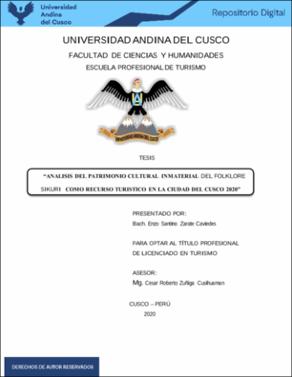| dc.contributor.advisor | Zuniga Cusihuaman, Cesar Roberto | |
| dc.contributor.author | Zarate Caviedes, Enzo Santino | |
| dc.date.accessioned | 2022-04-25T15:13:17Z | |
| dc.date.available | 2022-04-25T15:13:17Z | |
| dc.date.issued | 2021-01-06 | |
| dc.identifier.uri | https://hdl.handle.net/20.500.12557/4540 | |
| dc.description.abstract | El sikuri es polisémico ya que tiene varios significados como siku viene hacer el instrumento,
sikuri viene hacer el ejecutante y sikuris viene hacer el conjunto de personas que lo ejecutan esta
es una práctica ancestral colectiva desde tiempos pre-inkas como es Caral, Chincha, Mochica,
Nazca entre otros, ellos ritualizaron el siku como parte de su vida diaria. El problema principal
es la falta de conocimiento e identidad cultural del patrimonio cultural inmaterial del sikuri
dentro de la población del cusco. Se tiene como objetivo principal describir el Patrimonio
Cultural Inmaterial del folklore sikuri como recurso turístico en la ciudad del Cusco. La
metodología a utilizar es de enfoque cuantitativo, de nivel descriptivo y diseño no experimental
donde se encuestó a 70 colaboradores se pudo ver en los resultados que la población desconoce
del sikuri, su origen y de donde proviene de seguir así esta práctica del sikuri se vería extinta al
pasar de los años. Se concluyó que el Patrimonio Cultural Inmaterial del folklore sikuri como
recurso turístico, es accesible para el desarrollo del turismo, conjeturando que genera ingresos, es
una nueva modalidad de experiencia ancestral esotérica, para aquel que sea participe de estas
escenificaciones, reviva la identidad cultural por nuestra cultura, evitando que el folklore sikuri
con un valor, antropológico, arqueológico y musical que posee, pase desapercibido a través del
tiempo. | es_PE |
| dc.description.abstract | Sikuri is polysemic since it has several meanings such as siku comes to make the instrument,
sikuri comes to do the performer and sikuris comes to do the group of people who perform it.
This is a collective ancestral practice since pre-Incan times such as Caral, Chincha, Mochica
Nazca among others, they ritualized the siku as part of their daily life. The main problem is the
lack of knowledge and cultural identity of the intangible cultural heritage of the sikuri within the
population of Cusco. Its main objective is to describe the Intangible Cultural Heritage of Sikuri
folklore as a tourist resource in the city of Cusco. The methodology to be used is of a
quantitative approach, of a descriptive level and non-experimental design where 70 collaborators
were surveyed, it could be seen in the results that the population does not know about the sikuri,
its origin and where it comes from, following this practice of the sikuri would be seen extinct
over the years. It was concluded that the Intangible Cultural Heritage of Sikuri folklore as a
tourist resource is accessible for the development of tourism, conjecturing that it generates
income, it is a new modality of esoteric ancestral experience, for those who participate in these
performances, revive the cultural identity by our culture, preventing Sikuri folklore with its
anthropological, archaeological and musical value, from going unnoticed through
time. | en_US |
| dc.format | application/pdf | es_PE |
| dc.language.iso | spa | es_PE |
| dc.publisher | Universidad Andina del Cusco | es_PE |
| dc.rights | info:eu-repo/semantics/openAccess | es_PE |
| dc.rights.uri | https://creativecommons.org/licenses/by-nc-nd/4.0/ | es_PE |
| dc.subject | Patrimonio Cultural Inmaterial | es_PE |
| dc.subject | Folklore | es_PE |
| dc.subject | Sikuri | es_PE |
| dc.subject | Identidad cultural | es_PE |
| dc.title | Análisis del patrimonio cultural inmaterial del folklore sikuri como recurso turístico en la ciudad del Cusco 2020 | es_PE |
| dc.type | info:eu-repo/semantics/bachelorThesis | es_PE |
| thesis.degree.name | Licenciado en Turismo | es_PE |
| thesis.degree.grantor | Universidad Andina del Cusco. Facultad de Ciencias y Humanidades | es_PE |
| thesis.degree.discipline | Turismo | es_PE |
| dc.publisher.country | PE | es_PE |
| dc.subject.ocde | https://purl.org/pe-repo/ocde/ford#6.05.00 | es_PE |
| renati.advisor.dni | 42407661 | |
| renati.advisor.orcid | https://orcid.org/0000-0002-6895-8448 | es_PE |
| renati.author.dni | 47676366 | |
| renati.discipline | 014196 | es_PE |
| renati.juror | Flores Contreras, Aydee | |
| renati.juror | Deza De La Vega, Fredy | |
| renati.juror | Cornejo Conza, Karen | |
| renati.juror | Fuentes Monge, Leone | |
| renati.level | https://purl.org/pe-repo/renati/level#tituloProfesional | es_PE |
| renati.type | https://purl.org/pe-repo/renati/type#tesis | es_PE |


